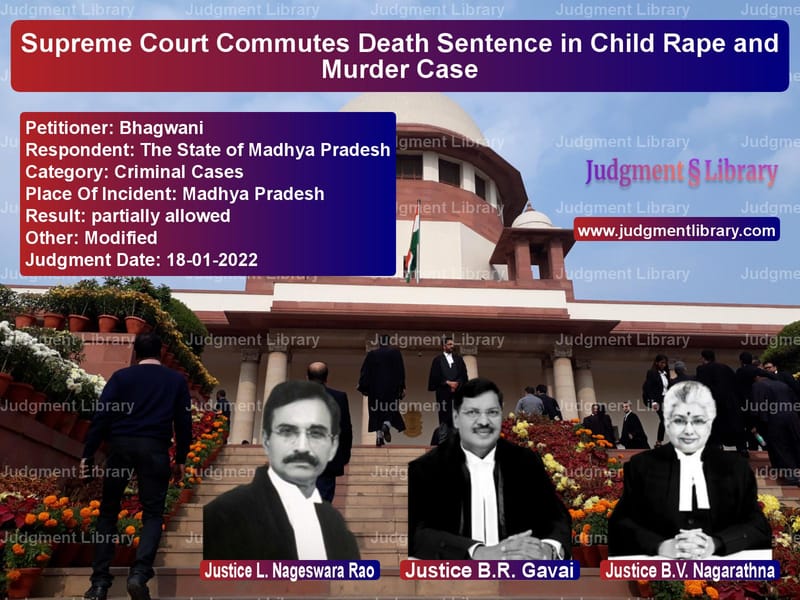Supreme Court Commutes Death Sentence in Child Rape and Murder Case
The Supreme Court’s judgment in Bhagwani vs. The State of Madhya Pradesh is a critical ruling on the sentencing of convicts in cases of heinous crimes. The Court commuted the death sentence of Bhagwani, who was convicted for the brutal rape and murder of an 11-year-old girl, to life imprisonment for 30 years without remission. This decision highlights the importance of a fair trial, consideration of mitigating circumstances, and the principle that the death penalty should be reserved for the ‘rarest of rare’ cases.
Background of the Case
The case originated from an incident on April 14, 2017, when an 11-year-old girl went missing after attending a family function. Her parents, realizing her absence, searched for her throughout the night. The next morning, she was found unconscious near a hand-pump with severe injuries. The investigation led to the arrest of Bhagwani and another accused, Satish.
The prosecution alleged that the girl had been kidnapped, raped, and murdered. A medical examination confirmed multiple injuries and signs of sexual assault. The accused were charged under various sections of the Indian Penal Code (IPC) and the Protection of Children from Sexual Offences Act (POCSO Act), including Sections 376A, 376D, and 302 IPC.
Read also: https://judgmentlibrary.com/supreme-court-cancels-bail-in-rajasthan-murder-case-upholds-rule-of-law/
Trial Court and High Court Rulings
The Trial Court convicted Bhagwani and Satish based on circumstantial evidence, witness testimonies, forensic findings, and medical reports. Both were sentenced to death. The High Court of Madhya Pradesh upheld the conviction and confirmed the death penalty.
During the pendency of the appeal before the Supreme Court, Satish passed away, and his appeal abated. Bhagwani’s appeal continued before the Supreme Court.
Supreme Court’s Observations
The Supreme Court reviewed the conviction and sentencing, considering the principles laid down in previous judgments regarding circumstantial evidence and sentencing in capital punishment cases.
1. Circumstantial Evidence
- There was no direct evidence linking Bhagwani to the crime.
- Key circumstantial evidence included witness statements, forensic reports, and medical findings.
- The Court found the chain of circumstances complete, leading to the conclusion of Bhagwani’s guilt beyond a reasonable doubt.
2. Fair Trial and Defense Rights
- The Supreme Court noted that Bhagwani did not receive adequate legal representation during the trial.
- The Court emphasized that the accused is entitled to a fair trial, and the lack of proper legal assistance violated his rights under Article 21 of the Constitution.
3. Sentencing Principles
- The Court reiterated that the death penalty should only be awarded in the ‘rarest of rare’ cases.
- The mitigating circumstances, such as Bhagwani’s young age (25 years), socio-economic background, and lack of prior criminal record, were not considered by the lower courts.
- The prosecution failed to present evidence proving that Bhagwani was beyond reformation.
Final Judgment
The Supreme Court upheld Bhagwani’s conviction under Sections 363, 366A, 364, 346, 376D, 376A, 302, and 201 IPC, along with Section 5(g)(m) read with Section 6 of the POCSO Act.
However, the Court commuted the death sentence to life imprisonment for 30 years without remission, stating:
“The Appellant is sentenced to life imprisonment for a period of 30 years during which he shall not be granted remission.”
Implications of the Judgment
- Fair Trial as a Fundamental Right: The judgment highlights the importance of providing adequate legal representation to the accused in capital punishment cases.
- Reaffirmation of Sentencing Guidelines: The ruling reinforces that the death penalty should be applied sparingly and only when reformation is impossible.
- Protection of Victims’ Rights: While the Court commuted the death sentence, it acknowledged the brutality of the crime and imposed a strict life sentence without remission.
- Judicial Review of Sentencing: This case sets a precedent for reviewing death penalty cases, ensuring that mitigating factors are carefully considered.
Conclusion
The Supreme Court’s decision in Bhagwani vs. The State of Madhya Pradesh reflects the judiciary’s commitment to ensuring that justice is served in a balanced manner. While upholding the conviction for a heinous crime, the Court recognized the importance of fair trial procedures and the principle that life imprisonment should be the default sentence unless the case falls under the ‘rarest of rare’ doctrine. The ruling serves as a significant precedent in sentencing jurisprudence in India.
Petitioner Name: Bhagwani.Respondent Name: The State of Madhya Pradesh.Judgment By: Justice L. Nageswara Rao, Justice B.R. Gavai, Justice B.V. Nagarathna.Place Of Incident: Madhya Pradesh.Judgment Date: 18-01-2022.
Don’t miss out on the full details! Download the complete judgment in PDF format below and gain valuable insights instantly!
Download Judgment: bhagwani-vs-the-state-of-madhya-supreme-court-of-india-judgment-dated-18-01-2022.pdf
Directly Download Judgment: Directly download this Judgment
See all petitions in Bail and Anticipatory Bail
See all petitions in Juvenile Justice
See all petitions in Custodial Deaths and Police Misconduct
See all petitions in Judgment by L. Nageswara Rao
See all petitions in Judgment by B R Gavai
See all petitions in Judgment by B.V. Nagarathna
See all petitions in partially allowed
See all petitions in Modified
See all petitions in supreme court of India judgments January 2022
See all petitions in 2022 judgments
See all posts in Criminal Cases Category
See all allowed petitions in Criminal Cases Category
See all Dismissed petitions in Criminal Cases Category
See all partially allowed petitions in Criminal Cases Category







